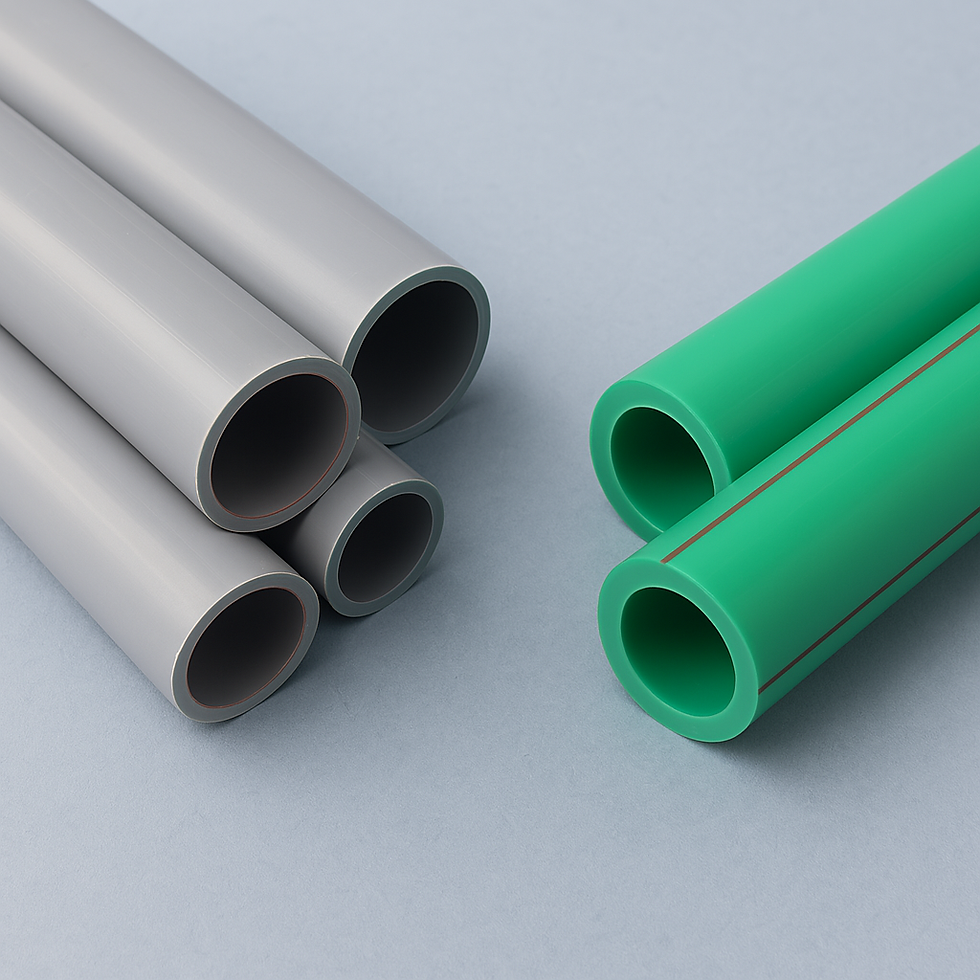UPVC vs PVC Pipes: Exploring the Key Differences
- Adamjee DuraBuilt
- Jul 31, 2023
- 3 min read

PVC (Polyvinyl Chloride) and UPVC (Unplasticized Polyvinyl Chloride) are two common types of plastic pipes used in various kinds of plumbing. Even if they have certain things in common, they also have unique qualities that make them stand apart. Making the best decision for your plumbing needs requires an understanding of the fundamental distinctions between UPVC and PVC pipes.
Material Composition
The primary difference between UPVC and PVC pipes is found in the materials used to make them. PVC pipes are more flexible and convenient to deal with since they are constructed from a mixture of plasticizers. On the other hand, UPVC pipes have a higher density of plasticizers in their formulation, which makes for a more stiff and robust pipe material. Because of their stiffness, UPVC pipes have good mechanical strength and chemical resistance, making them perfect for situations with corrosive materials and high-pressure applications.
Pressure Handling Capability
Compared to PVC pipes, UPVC pipes have better pressure handling capabilities due to their material composition. Because UPVC pipes have more plasticizers, they are stronger and better able to sustain high pressures. This makes UPVC pipes ideal for environments like industrial settings and water supply systems where regular water flow and high-pressure levels are required.
Chemical Resistance
The chemical durability of UPVC and PVC pipes is another significant difference. While both types of pipes can often resist a variety of chemicals, UPVC pipes offer a stronger defense against harsh and severe chemicals. For industrial applications involving the transportation of strong chemicals, this feature makes UPVC pipes very desirable.
Temperature Tolerance
Compared to UPVC pipes, PVC pipes have a lower temperature tolerance. PVC pipes may not be the ideal option for excessively hot or cold conditions while being able to survive a range of temperatures sufficient for most plumbing applications. The higher temperature resistance of UPVC pipes, on the other hand, makes them appropriate for use in both hot and cold water supply systems.
Cost and Affordability
When making a choice, the price of PVC and UPVC pipes is a key factor to take into consideration. PVC pipes often cost less than UPVC pipes because they require less plasticizer during production and are simpler to make. PVC pipes may be the best option if you are working with a limited budget and need a cost-effective solution. However, it's crucial to weigh the cost against the particular needs of your project and the long-term advantages of employing UPVC pipes in terms of performance and durability.
Installation and Ease of Handling
PVC and UPVC pipes may both be installed and handled quite simply, but there are a few minor variations to be aware of. Due to their greater flexibility, PVC pipes can be easier to deal with in small or complicated spaces. UPVC pipes' rigidity, on the other hand, could necessitate extra caution during installation, but their capacity to hold their shape over time may be useful in situations where straight runs and steady flow are essential.
Environmental Impact
In modern construction techniques, taking into account the environmental impact of the materials used is becoming more and more crucial. Plasticizers used in PVC pipes have the ability to dissolve away over time, potentially posing environmental risks. UPVC pipes, on the other hand, are seen as being more environmentally benign because of their increased plasticizer content, which reduces their susceptibility to leaching. If environmental awareness and sustainability are important considerations in your decision-making process, UPVC pipes may be more consistent with your principles.
Longevity and Maintenance
The durability and servicing needs of UPVC and PVC pipes are closely associated with their material characteristics. Longer service life and less maintenance are benefits of UPVC pipes' improved durability and corrosion resistance. PVC pipes are still resilient, but because of their relative weakness and chemical resistance, they could need more frequent maintenance and inspections. You may choose more wisely for your plumbing system if you take into account the long-term expenses and advantages of each solution.
Conclusion
When choosing between UPVC Pipes and PVC Pipes, consider each type's advantages and disadvantages in relation to the demands of your plumbing project. UPVC pipes are often preferred for applications that call for stronger pressure handling, chemical resistance, and long-term durability, even though both types of plastic pipes have their advantages. On the other hand, PVC pipes are a reasonably priced solution ideal for many common plumbing applications. Knowing the distinctions between UPVC and PVC pipes will enable you to make an informed choice that fits the needs of your project, resulting in a dependable and effective plumbing system for your house or place of business.












Comments